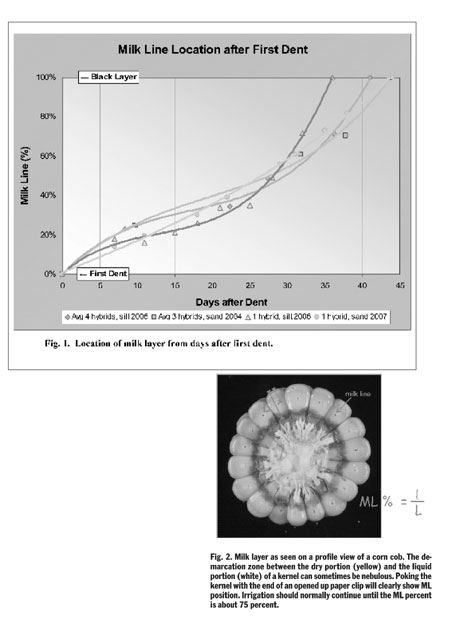Determining When To Apply The Last Irrigation On Corn Based On Milk
PORTAGEVILLE, MO.
Corn prices are up, so it
is important that irrigators
not hurt their final
yields by cutting off irrigation
too soon. One excellent
way to determine how long
apply irrigations is by the location
of the Milk Line (ML)
on the corn kernel. The ML
is the visible demarcation point on a corn kernel
between the golden yellow color and the
white color. The differences in color result
from the starch of the kernel having set (yellow)
and the portion in the kernel still liquid
(white). The ML starts from the top of the kernel
and moves downward towards the cob.
The University of Missouri Delta Center has
been conducting experiments in the last several
years to determine yield impact based on
last irrigation applied. These studies show
that the location of ML can be used as a tool
to determine when to cut off irrigation.
The ML period begins at first dent and concludes
with the formation of black layer. Popular
literature reports that this period lasts
about 20 or 30 days, but University of Missouri
research shows that the period is more
like 40 or 45 days. Other information from
the study shows that dent occurs at about
1850 corn Heat Units (cHUs) after planting. It
will take another 1100 cHUs to move from
first dent (when ML = 0 percent) to black
layer, when ML will be 100 percent. Black
layer represents final physiological maturity
of corn, and is so called because at this point
if the tip end of a corn kernel is gently rubbed
with your finger nail a black, sooty layer will
be seen. Figure 1 shows the ML progression
based on days since dent.

Late season rainfall plays a role in determining
the final yield as a function of ML location
when the last irrigation was applied.
The occurrence of some timely rains in early
August in very dry years will offset the negative
impact of having cut off too early. However,
in average years and assuming a
200-bushel per acre potential, yield losses
from cutting off irrigation at the 0 percent-
(i.e., first dent), 25 percent-, 50 percent-,
and 75 percent-milk line location would be
20, 14, 8, and 2 bushels per acre, respectively.
Figure 2 shows a profile of a corn cob
showing milk line location. Δ
Dr. Joe Henggeler is Irrigation Specialist
with the University of Missouri at the MU
Delta Center at Portageville.